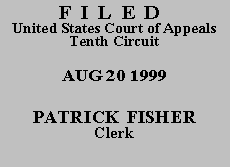

| ROBERT LEE CURRY,
v.
KEN KLINGER |
|
Mr. Curry, pro se, appeals the district court's denial of his habeas petition and requests a certificate of appealability. We deny his request for a certificate of appealability pursuant to 28 U.S.C. § 2253(c) and dismiss the appeal.
On June 23, 1994, a jury convicted petitioner of first degree murder in Tulsa County District Court. He was sentenced to life imprisonment on July 8, 1994. Mr. Curry appealed, and on December 27, 1995, the Oklahoma Court of Criminal Appeals affirmed his conviction and sentence. On December 26, 1997, petitioner filed an application for post-conviction relief in the state trial court. The state trial court denied relief on February 13, 1997. Petitioner filed a post-conviction appeal in the Oklahoma Court of Criminal Appeals on October 20, 1997 which the court dismissed as untimely on November 24, 1997. Petitioner thereafter filed a federal petition for writ of habeas corpus on January 9, 1998 which the district court denied. The district court also denied a certificate of appealability. Petitioner timely filed a notice of appeal and seeks a certificate of appealability from this court.
Mr. Curry argues that the district court erred in finding his habeas corpus petition time barred. He asserts that because the issues he raised went to the jurisdiction of the state trial court to try him or indicated his actual innocence of the crime, he qualified for equitable tolling or a fundamental miscarriage of justice exception. We disagree.
The Antiterrorism and Effective Death Penalty Act ("AEDPA") provides that "[a] 1-year period of limitation shall apply to an application for a writ of habeas corpus by a person in custody pursuant to the judgment of a State court." 28 U.S.C. § 2244(d)(1). Generally, the limitation period begins to run on the date petitioner's conviction becomes final. See 28 U.S.C. § 2244(d)(1)(A). Because petitioner's conviction became final before the enactment of the AEDPA, his one-year limitation period began to run on April 24, 1996, the statute's effective date. See, e.g., Hoggro v. Boone, 150 F.3d 1223, 1226 (10th Cir. 1998). Mr. Curry did not file his federal habeas petition until January 9, 1998 well past the one-year limitations period. However, we toll the period of time which Mr. Curry spent properly pursuing state post-conviction relief. See 28 U.S.C. § 2244(d)(2); Hoggro, 150 F.3d at 1226. Thus, we toll the limitations period from December 26, 1996 to February 13, 1997, the time during which Mr. Curry's application for post-conviction relief in the state trial court was pending.(1) Therefore, petitioner had 118 days from February 13, 1997 to file his federal habeas petition. Because he did not file the petition until January 9, 1998, almost seven months beyond the appropriate deadline, he is time barred from seeking habeas corpus relief. Moreover, the facts contained in this record do not support equitably tolling the AEDPA limitations period.
We therefore deny petitioner's request for a certificate of appealability because he has not made a substantial showing of the denial of a constitutional right. Mr. Curry has failed to demonstrate that the issues raised are debatable among jurists, that a court could resolve the issues differently, or that the questions deserve further proceedings. See Barefoot v. Estelle, 463 U.S. 880, 893 n.4 (1983).
This appeal is DISMISSED.
ENTERED FOR THE COURT,
Deanell Reece Tacha
Circuit Judge
*.This order and judgment is not binding precedent, except under the doctrines of law of the case, res judicata, and collateral estoppel. This court generally disfavors the citation of orders and judgments; nevertheless, an order and judgment may be cited under the terms and conditions of 10th Cir. R. 36.3.
1.Because Mr. Curry untimely filed his appeal to the Oklahoma Court of Criminal Appeals, we toll the limitation time only for the period his application for post-conviction relief was pending in the state trial court. "We may not count the additional time during which [petitioner] appealed the denial of his application for post-conviction relief because that appeal was untimely." Hoggro, 150 F.3d at 1226 n.4.